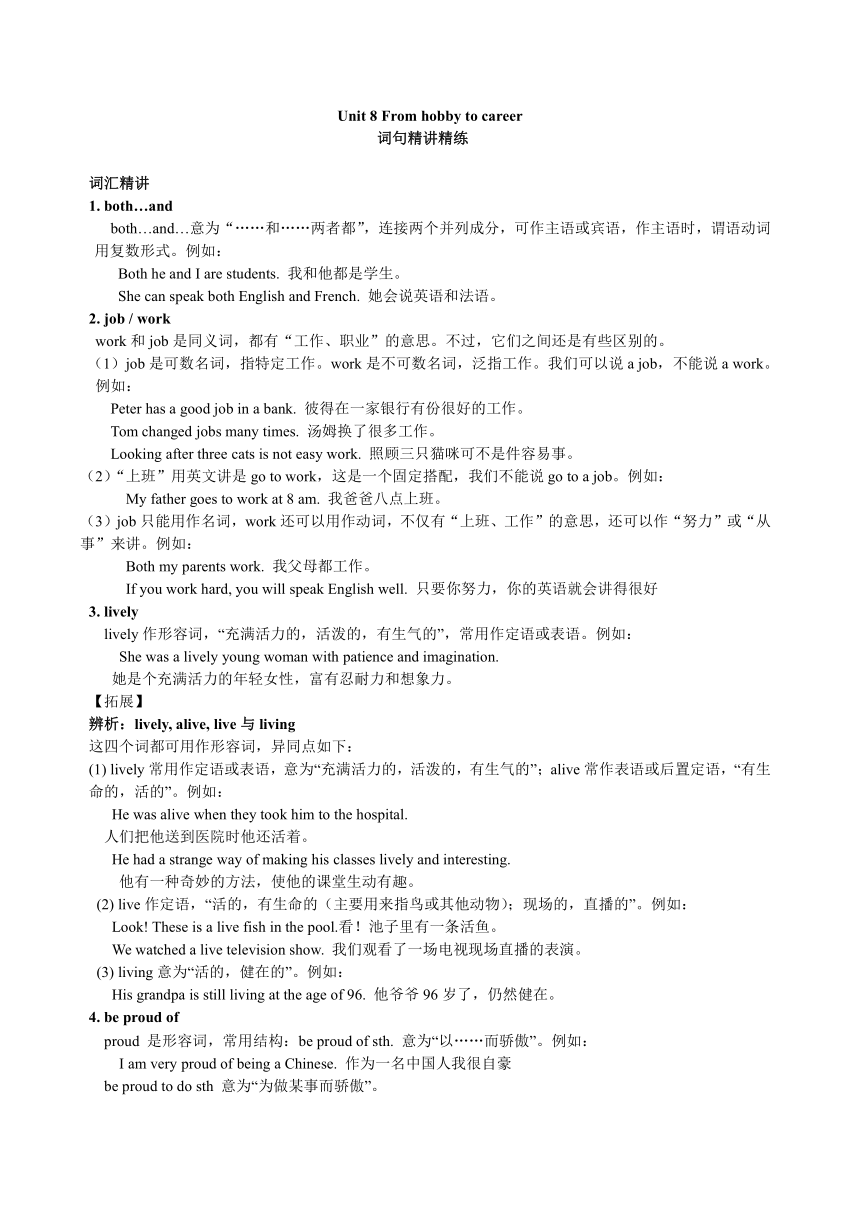
Unit 8 From hobby to career 词句精讲精练 词汇精讲 1. both…and both…and…意为“……和……两者都”,连接两个并列成分,可作主语或宾语,作主语时,谓语动词用复数形式。例如: Both he and I are students. 我和他都是学生。 She can speak both English and French. 她会说英语和法语。 2. job / work work和job是同义词,都有“工作、职业”的意思。不过,它们之间还是有些区别的。 (1)job是可数名词,指特定工作。work是不可数名词,泛指工作。我们可以说a job,不能说a work。例如: Peter has a good job in a bank. 彼得在一家银行有份很好的工作。 Tom changed jobs many times. 汤姆换了很多工作。 Looking after three cats is not easy work. 照顾三只猫咪可不是件容易事。 (2)“上班”用英文讲是go to work,这是一个固定搭配,我们不能说go to a job。例如: My father goes to work at 8 am. 我爸爸八点上班。 (3)job只能用作名词,work还可以用作动词,不仅有“上班、工作”的意思,还可以作“努力”或“从事”来讲。例如: Both my parents work. 我父母都工作。 If you work hard, you will speak English well. 只要你努力,你的英语就会讲得很好 3. lively lively作形容词,“充满活力的,活泼的,有生气的”,常用作定语或表语。例如: She was a lively young woman with patience and imagination. 她是个充满活力的年轻女性,富有忍耐力和想象力。 【拓展】 辨析:lively, alive, live与living 这四个词都可用作形容词,异同点如下: (1) lively常用作定语或表语,意为“充满活力的,活泼的,有生气的”;alive常作表语或后置定语,“有生命的,活的”。例如: He was alive when they took him to the hospital. 人们把他送到医院时他还活着。 He had a strange way of making his classes lively and interesting. 他有一种奇妙的方法,使他的课堂生动有趣。 (2) live作定语,“活的,有生命的(主要用来指鸟或其他动物);现场的,直播的”。例如: Look! These is a live fish in the pool.看!池子里有一条活鱼。 We watched a live television show. 我们观看了一场电视现场直播的表演。 (3) living意为“活的,健在的”。例如: His grandpa is still living at the age of 96. 他爷爷96岁了,仍然健在。 4. be proud of proud 是形容词,常用结构:be proud of sth. 意为“以……而骄傲”。例如: I am very proud of being a Chinese. 作为一名中国人我很自豪 be proud to do sth 意为“为做某事而骄傲”。 We are proud to be a league member. 我们为成为团员而骄傲。 【拓展】 pride是名词,意为“骄傲,自豪”。 常用的结构: take pride in sth. 意为“为某事骄傲”。 例如: They take great pride in her daughter who is now a famous scientist. 他们为成为科学家的女儿而感到自豪。 He is the pride of our city. 他是我们城市的骄傲。 5. decide decide是动词,意为“决定,选定”。名词为decision。 (1) decide on…意为“由……决定;决定于……”。后面接名词、代词或动名词作宾语。例如: I decided on going to Beijing at last. 最后我决定去北京了。 My mother decided on the red dress. 我妈妈决定买下那件红色的裙子。 (2) decide sth. 例如: I can’t decide anything at the moment. 现在我不能做出任何决定。 (3) decide to do sth. 例如: We decide to go to Paris next month. 我们决定下个月去巴黎。 6. at the end of at the end of意为“在……末端,在……尽头”,可以表示时间,也可以表示地点。例如: at the end of January在1月底(表示时间 ... ...
~~ 您好,已阅读到文档的结尾了 ~~